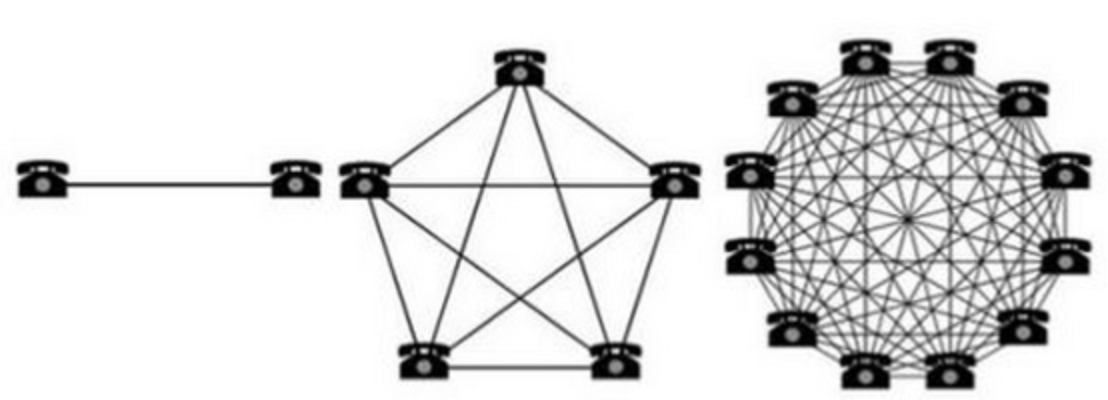
I’m a self confessed lover of technology and how empowering it can be. I make my career from evangelising the benefits of technology and I wrote my first lines of code on a 16k RAM-only computer, way before any of this was trendy. But I think we can all agree we’ve got a bit of a problem with friends, followers, fans, likes and especially free products. It’s inspired this manifesto, which explores Big Tech and why we can do something to fix it, why we should do something to fix it and why history tells a clear story that we’ve been here before. (A long read 15 mins for people who care about the future)
But before I do that, it’s very important we clear something up.
I Am a Raving Capitalist.
Everything you read below is through the lens of enabling free enterprise and ensuring we have a free and competitive market place. A world where big companies, small companies, freelancers and employees can all thrive. One where we can keep in check a very small number of giant invasive species which threaten to destroy the free market ecosystem.
But in order for us to have a future we want to live in, we need to adjust the guardrails of capitalism so that it doesn’t end up as a new kind of technology feudalism. It’s worth remembering that with each technology reset, we need to reset the rules of capitalism so that the structure of our economy suits the tools we do business with.
Internet 1.0
It was difficult to conceive how important the internet would be to our lives back in the mid 1990s. To simply connect to the web with dial up took ‘minutes’ and now it takes 4 seconds to download a 2 hour movie using 5g. After the Dot Com crash of 1999, most yet-to-be-disrupted big firms got back to business. But when the web 2.0 era emerged circa 2004, it really did feel like we’d discovered some kind of utopia. A seemingly new era of truth had emerged where we could find out anything about anything. For free. On line. Bust our own myths. Uncover what was happening. Connect directly with anyone around the world on any topic. Honestly, 15 years ago, I thought this would be the end of lying as we know it. How could anyone ever lie again if we could just check it out on the internet and find out the truth! It felt like it would be the end of centralised power and that the world would just connect directly, without the need for intermediaries.
And the new internet firms? Google, Facebook, Twitter and the like – I even thought that they would be different to the old cold-hearted industrialists. They all sounded so friendly and nice. Bright primary coloured logos, free sushi, slides in their offices and brand mantras which sounded so empowering: A more opening and connected world, Change the world 140 characters at a time. How could they be anything but nice…Oh, what techno-hubris I endured. Don’t be evil? To your shareholders at least.
How New Industries are Born
Capitalism evolves and new industries are born by doing one simple thing. They take things that were ‘outside of the market’, things that don’t have a price, things that aren’t commodities, and sometimes did not even have an owner. People then find ways to drag these things into the market sphere, so they they are able to be commodified, bought and sold.
We did that with nature – land, trees and the oil under the ground that powers our world. Industrialists just took it and sold it. New industries never ask if it’s ok to sell a new raw material, they just take it and commercialise the demand for it. If it makes people’s lives better in the short term, people will always buy it. In general, humans struggle with long-term decision-making because we’ve evolved over hundreds of thousands of years to survive, where survival was a daily game. At best, season by season.
And the latest commodity to be commercialised is data. A new commodity which has been brought into the market by technology firms, priced and sold.
Just because a new industry is born, it doesn’t mean we have to accept it in its initial incarnation. It’s our prerogative to shape it and civilise it. Right now, history is more important than ever, because we’ve been here before. We’ve changed the way industries operated to make them more human and minimise their externalities. If there were ever any evidence that we can change a commercial situation, the picture below is it. It’s actually Venice beach in the halcyon days of drilling for oil wherever you please. You may have noticed it’s changed a bit since.

The High Cost of Free
While many of our digital services (like Facebook and Google) are free, they come with real costs. Everything has a price, even if that price we pay isn’t money. There’s always a value exchange of some sort. The old maxim in digital is that if you’re getting the service for free, you can be sure you’re the thing being sold. The price is we pay now is data. So how much is that price? It’s actually a question worth asking – and certainly worth understanding if we want to know if the deal is worth it for us. So here it is: for all the privacy invasions, security risks and and fundamental changes in our personal and domestic domains, this is what these companies* generate in revenue:
- Google – about $150 a year per person.
- Facebook – about $80 a year per person.
*Numbers for Australian market.
We’ve given up all our privacy for just over $200 bucks a year, which we don’t even pocket. A good deal, I reckon… for them.
Surveillance Capitalism
The big discovery that allowed Surveillance Capitalism to emerge and flourish was the idea that you can take Private Human Experiences and drag it into the market place. Who we know, where we go, what we believe, what turns us on, where we live have been commodified. The Surveillance capitalists call this behavioural data. Then they take the data, add a computation here and there, and bundle it up to to create an entirely new market. One which is based in inferences and predictions of what we will do now, soon and later. They know literally every single thing about us – much more than we share, because this data creates a pattern, which is then fed into machine learning which can infer and fill in the gaps of what we don’t say, do or click on.
It’s just not data, it’s much more than that. It’s our personal life experiences, our memories and our dreams. They’ve commercialised our spirits, bottled up our souls and sold it to the highest bidder – yes, bidder. Advertisers bid for our attention in online auction systems.
But this is different to oil or land. This data hasn’t just been taken from us without permission, it’s actually being used against us. In some ways, we are being manipulated because of how much they know about us. The more they know, the more they can keep us coming back for more. They are creating subconscious social incentives, based on our deepest human needs for love and acceptance to keep us feeding the beast. They are using our evolutionary survival traits like our fear receptors to keep us outraged and feeding their platforms. It’s not cool. It’s actually dangerous.
Terms and Conditions
In fairness to them though, they did tell us what they were doing. In clear black and white, for all of us to read, they gave us their legal terms and conditions – a lovely set of their own laws like they’re a nation state. Laws that no mere mortal without a law degree would ever understand articulated in 20,000 + words, that they know we read and understand after we all clicked ‘accept’…in approximately 2.1 seconds. To prove the point that no one reads terms and conditions, a few years ago tech security firm F-Secure offered free public wifi. Hidden in the terms and conditions was a small clause that the recipients would also agree to giving up their firstborn. It became a global news story – yet still nothing has changed.

So I actually read and counted the words for the Amazon Alexa terms and conditions.
It was exactly 21,323 words.
The crazy bit is that this was one link layer deep. Many of the terms have up to 10 layers of links to further terms, which in order to ‘agree’ to, you have to keep clicking and reading on. The average length of tech companies’ terms and conditions is a little over 200,000 words of legalese. In order to understand the terms of our daily tech browsing for just five technology services, we’d have to read over 1 million words every time the terms and conditions are updated. That is 83 hours of reading. Most of which is beyond the comprehension of anyone without a law degree. If technology has become a quasi-religion, and Steve Jobs is our nerd Jesus, we’ve come along way from the 10 simple Commandments! And none of this is to even say that what’s in the terms and conditions are even legal. It’s worth remembering that laws can only exist where we’ve outlawed socially undesirable behaviour after it has emerged. This is where big tech takes us for a ride.

GMAIL
Just think about Gmail for a minute:
- Open someone’s mail and read it without asking = mail fraud, 5+ years in prison.
- But Google opens the mail of other people who didn’t sign up to the terms (ie those who send an email to a Gmail user) and nothing happens.
- We need to start treating the digital and the physical world the same way.
Ingredients
Imagine for a moment that you bought something at the supermarket – packaged foods you intend to eat and it didn’t have an ingredient list, let alone a nutrition panel. You’d think twice about consuming it, wouldn’t you? In the early days of packaged foods, this was the way things were. It was exactly as explained – we had no idea what was in the box. Before the early 20th century, food and medicine we consumed was a total crap shoot. Lemonade with lithium, Cola with cocaine, cough medicine laced with heroin.
Then we asked, hey, what’s in that?
There were literally no regulations and often no information as to what we were all consuming if it wasn’t in its raw form – like a banana, apple or wheat. Eventually, we collectively decided this wasn’t good enough. Packaged food and beverages were marketed as natural and safe, filled with secret ingredients (sometimes dangerous) were developed by the manufacturers, so they could sell more and keep it shelf stable for longer.

It’s a bit like saying Facebook makes a more open and connected society, when it does the opposite. It creates a more siloed and disconnected society. The difference between then and now is that we could test what was in it. We could take the product home and test it in the lab. See what was really in it and also test the impact of the ‘secret‘ ingredients. In the past we could look under the bonnet of a car and check out the mechanical features. We can’t even do that anymore as cars have morphed into rolling computers.
Today with algorithms we have a secret black box. Just like last century, corporations claim they can’t tell us what’s inside their algorithms as it’s ‘a trade secret’. They can’t tell us what’s inside their digital black boxes for commercial reasons. Well, we’ve heard and seen that before and we didn’t tolerate it. The point is we, as a society, get to decide what’s acceptable – not them. After any statement like this, they’ll just pop up with their classic rebuttal: users can just opt out.
Opting Out Isn’t an Option
It’s simple really – Opting Out isn’t an option. If you want to participate in the modern economy, then it simply cannot be done without using our new digital infrastructure. Try going for a week without using a computer, smartphone, search engine, ecommerce, social media account, SMS, private message or email, to name a few services. Anyone wanting to be able to do their job or a run a business would find this extremely difficult. It’s nigh on impossible. And trying to avoid the likes of Google, Facebook, Microsoft, Amazon or Apple in undertaking these tasks would prove just as difficult. Even if you wanted to. The reason is simple: network effects. The nerds reading this will know about Metcalfe’s Law:
Metcalfe’s law states that a network’s power is proportional to the square of the number of connected users to the network.

Basically this means that networks of all kinds become more useful when more people use the same one. So it makes sense that we all use the same social media network and a single search engine that learns and gets better based on every search that is entered into it.
Natural Monopolies
Business like these, or systems that behave this way, we call natural monopolies in economics. Natural monopolies are why each country has a single telephone numbering system, a single currency, a single set of train tracks, a single operating systems for things like electricity, water and gas and a national language. The network effects these create make it more efficient for everyone to be using the same network. In order to do business and interact effectively, we need a single system. Another key feature of natural monopolies is that their marginal costs go down with more people using a single system. It creates a huge barrier to entry for new players and these network effects create a winner takes all situation. These new ‘Natural Technology Monopolies’ that have emerged will be increasingly difficult to disrupt, and in my view are now entering the realm of Public Infrastructure. They are the new Meta-Structure – it’s the information – the ‘meta’ which sits above the traditional infrastructure of the concrete and steel, the intelligence which connects and allocates resources. The Meta-Structure is the most powerful asset of the modern digital economy.
What we must remember is that new natural monopolies emerge as new technology arrives, as per railways and phones. When it becomes a vital part of the competitive infrastructure we all must use, then it needs to be nationalised or highly regulated.
We’ve Been Here Before
It’s easy to forget that many previously private industries were nationalised for the public good, because their success had taken them beyond ‘private’ and to the point where they were of national importance. Highways, roads, telecoms, universities, airlines, airports, water, energy, et al. Right now there is only one country with digital sovereignty and that’s China! Even the USA, with its own giant technology firms, has been hacked by adversaries using its tools against it.
Two hundred yeas ago in the USA, railways were the equivalent of big tech. An unstoppable economic force. But this didn’t stop the Government having the courage back then to take it and put the industry in public hands. They said, ‘Thanks for building that, but we’re taking it back!’ It was the right move to make.
Perhaps now it’s the time for big tech to be nationalised. And big tech knows it. They spent $65 million this year on lobbying. Google alone spent $21.7m. In comparison, the NRA, who exerts a massive legislative influence in the USA, spent a mere $9.6 million. These numbers don’t include any spending on specific campaigns or PACs (Political Action Committees). Technology companies to date have avoided the antitrust argument, because for the past 40 years the concept of antitrust has focused on consumer harm – and that if prices are getting lower, how could that possibly harm the consumer? With Amazon driving prices lower and Google and Facebook providing ‘free’ services, they have for a long time avoided scrutiny and simply acquired any company that merely appeared like a threat long before it became one. This is easy to do when you can see who is getting traction on your very own web services. But the positive sentiment around technology companies has shifted. They took their power too far and now they are getting ready for a fight.
How Big is Big Tech really?
The top 5 US technology companies (Google, Facebook, Amazon, Microsoft and Apple) have a market capitalisation of $3.86 trillion as at 6/6/19. The GPD of the USA was $20.4 trillion in 2018, which means that these 5 technology firms are collectively valued at 19% of the entire US economy. These firms aren’t just big, they’ve colonised every country except China. We now live in an era of Digital Colonialism where we no longer own, control or even run, our most important economic infrastructure. We’ve lost our sovereignty.
Free Market Capitalism
There has never been a purely capitalist society in the history of humanity. The truth is the mixed economy model is what has provided the greatest distribution of wealth the world has ever seen. This economic system single handedly invented the middle class.
As a reminder, this is the model that the west has thrived under. A system where the government protects private property, allows profit-seeking free enterprise and the use of capital, but importantly, interferes in economic activities in order to achieve social aims and ensure markets remain competitive. It is important governments don’t simply provide healthcare, education, defence and the like. They must also regulate against private enterprise embarking on anti-social behaviour in the pursuit of profit maximisation. They must regulate to protect our environment and they must enforce antitrust principles. If they don’t do this, then capitalism devolves to look something very like its opposite.
Capitalism without antitrust in many ways starts to behave like Communism. We end up with a few powerful players controlling the market and making all of the decisions. But rather than the enterprises being in public hands and run by Government officials, they are privately held and controlled by the founders of the companies, who increasingly set up corporate structures in which they can never be voted out. It’s something both Xi Jinping and Mark Zuckerberg now have in common: an inability to ever be pushed out of their leadership positions, regardless of their non-majority financial stake in what they control.
Taxes
In his first inaugural address President Ronald Reagan famously said: Government is not the solution to the problem, government is the problem. This was a seismic shift from where we had been and it has defined the government economic playbook. Where Johnson, Nixon, and Carter had expanded the role of government economically, Reagan wanted to shrink it by cutting:
- Government spending
- Both income taxes and capital gains taxes
- Regulations on businesses.
This was the start of a 40 year war on Government intervention. It gave regulation a bad name and created a doctrine that said that taxes were bad for the economy. That lowering taxes creates jobs. That private industry is better and smarter than Government and that all important industries should be run and owned by the private sector. Government should just get out of the bloody way. It may well be that Reagan was right in the early 1980s, but it is not what we need now. And as for Government not being able to do anything well? Think about the terrific job they’ve done with regulation next time you drink clean tap water, drive safely on our roads, catch an airplane, wave your kids off to school and plug in your vacuum without getting an electric shock. Government is Good.
But big companies don’t like pay big taxes. They not only think they’re gods, they also act like religions and don’t pay their fair share of taxes. Here’s one for your philosophical musings: Google has paid more in fines in the EU than they have tax since they existed. Recently Facebook made a $4 billion allowance in their earnings call anticipating future fines by the FTC and their share price went up by $40 billion after the announcement. Why? Because shareholders liked that it was only 2 weeks revenue or 6% of cash on hand.
Most multinationals are very good at avoiding tax. Whether it is siphoning profits to low tax havens or reinvesting profit for growth and not paying dividends, as Amazon does. They operate under a different set of rules, compared to mere mortals like us. So let’s just be honest: the multinational tax system is a sham when you and I pay more than companies – 30% for them versus the 45% top rate for people. And their favourite trick is buying things from themselves which become valid tax deductions. Yes, this is as crazy as it sounds. Let me give you an example. Most global brands rent their own intellectual property from themselves – assets like trade marks, designs and even Artificial Intelligence are put into business units they own and control in low tax markets, to which they pay royalties for the use of them. But it’s the same friggin’ company. If you’re wondering why our governments haven’t got enough budget to pay for hospitals and schools, you can start at the global tax fraud which is related-party transactions. To provide an analogy which would be the same behaviour for a human it would be this:
A person working in country A (highly taxed jurisdiction) registers their brain in country B (low tax jurisdiction) and pays a huge percentage of income generated in country A to country B which then becomes a valid tax deduction. But the items aren’t real (brands and IP) and don’t exist in the real world – they live in the ether to purely move money around. It’s a total scam that we all pay for in social services we miss out on in our local market.
Why Are They So Profitable?
Firstly, let’s remember that every big technology firm is a child of the space race and the technologies NASA developed on the taxpayer’s dime. Big tech built fortunes on public R&D, while Sir Tim Berners-Lee gave a gift to humanity with the WWW – same technology, different attitude. Another one of the reasons that these technology companies are so profitable is because they are so new and they don’t have to clean up any of the messes they make. Their negative externalities are borne by society. Some would include: invasion of privacy, data hacks, facilitation of hate groups, spreading of false information, meddling in elections and their tools being seconded by nefarious actors.

Chemical Industries used to be like this. It was the most profitable industry in the 1950s and 1960s when they could just ditch their effluent in a nearby river and put toxins into our food chain. Then after the EPA and environment regulation came around, their profitability returned to normal. They had to stop polluting and actually make sure their products were safe. Of course the chemical firms argued against this, saying it would negatively impact their profit and put their product costs up for everyone. It’s exactly what we hear now. Facebook says, it couldn’t possibly vet every Facebook live video before they start streaming it. Yet TV has to do that, so what makes you so special, Mr Zuckerberg? TV has a 7 second delay. You wanna dance, you gotta pay the band. ‘Oh, but it doesn’t suit our business model’ . Well, suck it up, Zuck – it seems you might have to change your business model or hire 100,000 people to vet live streams. We don’t want to see murder and rape on your platform.
The other argument Facebook loves to put forward is that they are a technology company, not a media company, and so the rules for media organisations don’t apply to them. So let’s put that argument to bed once and for all:
Anyone who sells advertising around content = media company.
The who and how this is done is irrelevant. I’ll add that they do actually make editorial decisions when they filter content through algorithms. They decide on purpose to promote content which lives on the extremes. In any case, if they argue they are a town square or public utility (like a phone), then they shouldn’t be a for-profit firm owned by individuals. If we won’t tolerate a polluted waterway, why should we tolerate a polluted public discourse?
Yes, they are media companies and they need massive regulation, even if it reduces their profitability by 90%.
Regulation
In a civilised society we need to ‘civilise’ the technology we use. We’ve done this before to wonderful effect.

The world I want to live in is one where we get have our technology and eat it too. Yes, we want cars, but we want brakes that aren’t made of wood (yes, Model T Ford brakes were originally made of wood). We want seat belts, safety features, emissions standards, road rules and licensing. Yes, we want electricity in our house, but safe switches and safe white goods that won’t electrocute our children. Yes, we want jobs in the factory and the goods they produce, but we want safety guards on the machines, safe packaging and work place health and safety – even if all of this makes the products cost a lot more. Civilised economies need rules so that we can live civilised lives.
Real Capitalism is civilised. One of the most capitalist things we can do is create regulation. Regulation when done well is the bellwether for economic growth and prosperity – and don’t let anyone ever tell you otherwise. Regulation is what invented the middle class – regulation creates new industries and regulation helps us build a world which is liveable and fair. It saves lives and invents jobs.
How many people worked in workplace safety before we had occupational health and safety rules? Approximately zero. How many safety features in cars have invented entirely new industries to support those features? Too many to mention. Making the services and features of anything safer creates more products and services, more industries and more jobs. If you’re ever in doubt of this, just spend some time in a third world country with little regulation and you’ll see with your own eyes how well their economy is doing.
But we also need to remember this: No for-profit industry in history has effectively self regulated out of the goodness of their hearts. It’s up to us to make it so.
So what should we do now?
It’s clear that I have discussed many big ideas here. And I truly believe that fixing these will go a long way towards promoting economic growth that can be shared more broadly in society, build new support industries and make this technology revolution what we all hoped it would be. While I won’t write another 5,000 words here on how to fix it (I’ll do that another day) – I’ve got three simple things we can do quickly which will create a massive fork in the road. A fork which will lead us to a both a stronger and more humane economy and kibosh the path we are taking to Surveillance Capitalism.
1. A single set of terms and conditions for all digital products: A short and succinct rule book for all digital products with no exceptions. Just like we have a single set of road rules and safety features for all cars. Designed by experts, enforced by government, written for people, in language everyone can understand.
2. Algorithm Transparency: All algorithms need to be made public on all digital products for users to both see, and have the immediate choice to opt out of.
3. Break up or Nationalise Big Technology Companies: All countries should develop their own search engines and social media that are open source software stacks which their society can run and iterate collaboratively on. The USA needs to break up big tech into small parts and nationalise the services.
It’s Urgent
Shit’s about to get real. Maybe you think this stuff doesn’t matter that much, privacy invasion on social media etc… a few hacks here and there… a few powerful companies – what’s new?
Well, stop and think about this for a minute. This digital stuff is about to become physical stuff. It’s about to run your electricity grid, drive your car, control your house, probably regulate your heart beat and augment your brain. Digital is now infiltrating the physical world and will soon be inside our bodies. I promise, it’s coming. We have to fix this stuff now – before we finish building the computational cage we live in. We have to fix it before all things are connected to the internet. We have to ensure we have digital transparency, governance and incentives to match the society we want to live in.
It’s time to ensure our technology empowers capitalism, not surveillance. It’s time to take the power back.